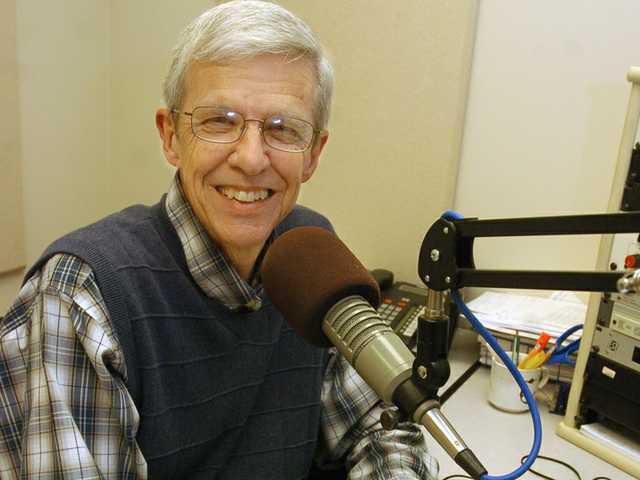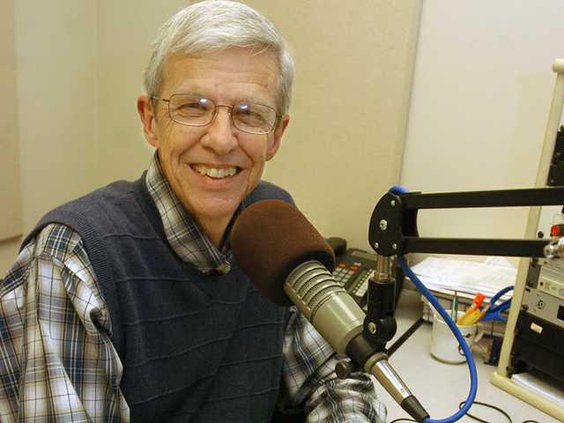Ken Stanford never intended to get into the news business.
But after 40 consecutive years broadcasting the news to radio listeners across Northeast Georgia, he's having a hard time getting out of it.
Stanford, 67, walked out of Jacobs Media on Green Street last week for the final time as full-time news director for WDUN-AM 550.
Monday will be one of the few times since his 20s that he will not pull his vehicle up the near mountain that is the driveway to Jacobs Media Corp., Gainesville's family-owned radio station for more than 60 years, and work on the news
before dawn.
Stanford has been a constant overseer of Gainesville's newsmakers, his tenure as a reporter spanning nearly all of Gov. Nathan Deal's public career.
Industry insiders say local news broadcasters are becoming somewhat of an anomaly.
And Stanford, who has reported the news or directed its coverage at the station for four decades, is especially rare.
"I don't know what he'll do with himself when he's not on the radio," said Wade Medlock, former news director of the statewide Georgia News Network, who served alongside Stanford in the Georgia Association of Newscasters in the late 1970s.
Stanford also doesn't seem exactly sure how he'll deal with his own radio silence.
"I'm going to take it one day at a time," he said.
There is a lot for him to let go. Sometime before the Moultrie native even reached the first grade, Stanford said he could feel himself getting caught up in the radio waves.
Then, a school trip to a Tifton radio station really sealed the deal.
It was the atmosphere. The room full of records. The disc jockey talking to his invisible audience and dictating their listening experience. Something about it lit a fire.
"I was just fascinated," Stanford said.
Stanford didn't care much for news at first, though. He came to Gainesville for the first time in the mid-1960s when WDUN-AM 550 was primarily a music station. After three years, he inherited a reporter's cap with a news station in Marietta.
He was pretty sure it was a mistake at first. Getting up early to check crime logs at two police stations before heading to the office wasn't the most appealing of endeavors.
But at some point, reporting the news began to seem like a meaningful career.
"I guess it's true of a lot of us in this business: I like to know things. I like to know what's going on and to feel like I'm providing a service to the listener," he said. "I'm telling them something that they either want to know and/or need to know. ... I felt like I was doing something important."
When Stanford returned to WDUN in 1971, it was still primarily a music station. But there were local newscasts and a small news department.
There, Stanford found his place for the next four decades, the love of his life, second only to wife Sandra.
From that place, Stanford watched as Hall County's population grew from fewer than 60,000 people to nearly 180,000. He helped tell the story of governments trying to deal with growth.
In the mid-1980s, Stanford's local reporting took him to the nation's capital, where he sat beside George H.W. Bush and interviewed the future president at a conference.
He later took his microphone to Soviet Georgia and captured on tape some of the first comments residents there made without fear of censorship or the KGB.
Stanford spent two weeks there in 1990 when several Hall County residents stayed in the homes of Soviet Georgians as the USSR was dismantled.
"(Listeners) could hear the emotion in their voice," said Stanford. "That came through. That brought it home. It gave a human touch to it rather than me trying to relay what they said."
"They heard these people talking - either in broken English or through a translator - excitedly talking about the prospects of freedom and being out from the arm of the Soviet Union.
"I thought ‘this is what it's all about,' you know, covering something on this scale and being able to take it back home and let the people back home know what it's like," he said.
Matt Cook, the current news director at the Georgia News Network, recalls Atlanta radio newsrooms that were two or three times their present-day size in 1989. And that's just the ones in the state's biggest city.
"Smaller stations, more and more of them are leaving news departments behind," said Cook.
A number of them subscribe to the GNN, which serves as a statewide wire for radio broadcasters. But even it relies on locally produced stories, which are fewer by the day.
"As far as news departments go, we probably used to hear from 30 or 40 of them on a regular basis," Cook said. "Now, I could say there are probably a dozen or 15 that have solid news departments. That's probably a little scary."
Medlock, Cook's predecessor, said Stanford was always a good source of stories from Hall County.
"You never had to worry about whether they were fully vetted," Medlock said. "Ken was and is a journalist of high integrity."
As a former WDUN host, newspaper reporter and now government official, Harris Blackwood remembers Stanford as an established newscaster when Blackwood started his career at the age of 15.
He calls Stanford "the dean of newscasters in Georgia."
Stanford said he probably had between six and eight opportunities to move on.
"But each time I looked at the pros and cons of making a change," Stanford wrote in an email. "The pros of staying, namely the people I worked for, the community - a great place to raise a family - and so forth, outweighed everything else, and I chose to stay."
The next thing he knew, 40 years had passed.
"I have kidded him for years that he would be around to announce the end of the world," Blackwood said. "I hope if that happens, he will come out of retirement."
Stanford says he has psyched himself up for retirement, giving the idea more than a year of consideration.
BJ Williams, whom WDUN owner Jay Jacobs said Stanford has trained, will take the reins in the newsroom next week.
And after 40 years, now seems like the right time to go. Though he wonders how long it will take him to get used to sleeping later than 4 a.m.
As he worked out his final hours on the job last week, something about Stanford seemed calm, accepting of the future.
He lightly tapped his shoulders, indicating the weight that will no longer be there, when he described the relief retirement will bring from the constant deadline, the incessant quest for accuracy.
"I'm looking forward to a little break," he said.
His boss, Jay Jacobs, calls Stanford's retirement a little more than a "long winter's nap."
And indeed it will be a winter's nap. While Friday was his last day as a full-timer, Stanford will return part-time in the spring to help with future projects for the station's website and election coverage.
Sometimes, even when the final deadline has passed, it takes a while to get the story out of your system.
"I really don't think it ever leaves you completely," Stanford said. "I'm just going to take it one day at a time, and I'm going to try my best to enjoy it."

